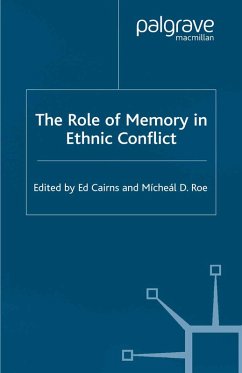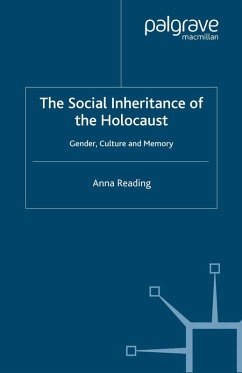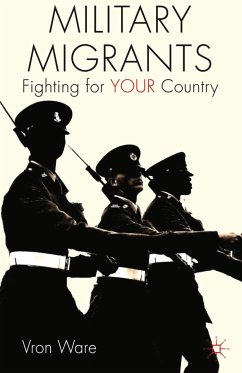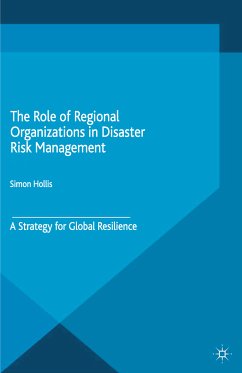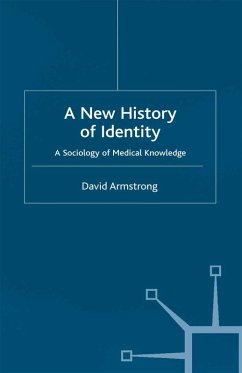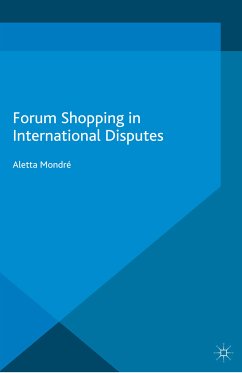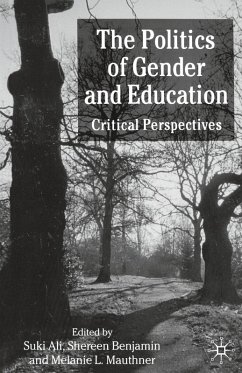73,95 €
73,95 €
inkl. MwSt.
Sofort per Download lieferbar

37 °P sammeln
73,95 €
Als Download kaufen

73,95 €
inkl. MwSt.
Sofort per Download lieferbar

37 °P sammeln
Jetzt verschenken
Alle Infos zum eBook verschenken
73,95 €
inkl. MwSt.
Sofort per Download lieferbar
Alle Infos zum eBook verschenken

37 °P sammeln
- Format: PDF
- Merkliste
- Auf die Merkliste
- Bewerten Bewerten
- Teilen
- Produkt teilen
- Produkterinnerung
- Produkterinnerung

Bitte loggen Sie sich zunächst in Ihr Kundenkonto ein oder registrieren Sie sich bei
bücher.de, um das eBook-Abo tolino select nutzen zu können.
Hier können Sie sich einloggen
Hier können Sie sich einloggen
Sie sind bereits eingeloggt. Klicken Sie auf 2. tolino select Abo, um fortzufahren.

Bitte loggen Sie sich zunächst in Ihr Kundenkonto ein oder registrieren Sie sich bei bücher.de, um das eBook-Abo tolino select nutzen zu können.
What insights can we gain from the social sciences about the role memory plays in creating or re-creating the many conflicts threatening global peace in the twenty-first century? Indeed, can knowledge about the relationship between memory and conflict help resolve intergroup conflicts and heal individual hurts? This book presents a series of essays both theoretical and empirical that approach these questions from a variety of disciplines that will highlight a much-neglected aspect of one of the major problems facing the world today.
- Geräte: PC
- ohne Kopierschutz
- eBook Hilfe
- Größe: 1.44MB
Andere Kunden interessierten sich auch für
![The Social Inheritance of the Holocaust (eBook, PDF) The Social Inheritance of the Holocaust (eBook, PDF)]() A. ReadingThe Social Inheritance of the Holocaust (eBook, PDF)40,95 €
A. ReadingThe Social Inheritance of the Holocaust (eBook, PDF)40,95 €![Military Migrants (eBook, PDF) Military Migrants (eBook, PDF)]() V. WareMilitary Migrants (eBook, PDF)40,95 €
V. WareMilitary Migrants (eBook, PDF)40,95 €![The Role of Regional Organizations in Disaster Risk Management (eBook, PDF) The Role of Regional Organizations in Disaster Risk Management (eBook, PDF)]() S. HollisThe Role of Regional Organizations in Disaster Risk Management (eBook, PDF)40,95 €
S. HollisThe Role of Regional Organizations in Disaster Risk Management (eBook, PDF)40,95 €![A New History of Identity (eBook, PDF) A New History of Identity (eBook, PDF)]() D. ArmstrongA New History of Identity (eBook, PDF)73,95 €
D. ArmstrongA New History of Identity (eBook, PDF)73,95 €![Forum Shopping in International Disputes (eBook, PDF) Forum Shopping in International Disputes (eBook, PDF)]() Aletta MondréForum Shopping in International Disputes (eBook, PDF)40,95 €
Aletta MondréForum Shopping in International Disputes (eBook, PDF)40,95 €![The Politics of Private Security (eBook, PDF) The Politics of Private Security (eBook, PDF)]() A. WhiteThe Politics of Private Security (eBook, PDF)73,95 €
A. WhiteThe Politics of Private Security (eBook, PDF)73,95 €![The Politics of Gender and Education (eBook, PDF) The Politics of Gender and Education (eBook, PDF)]() The Politics of Gender and Education (eBook, PDF)40,95 €
The Politics of Gender and Education (eBook, PDF)40,95 €-
-
-
What insights can we gain from the social sciences about the role memory plays in creating or re-creating the many conflicts threatening global peace in the twenty-first century? Indeed, can knowledge about the relationship between memory and conflict help resolve intergroup conflicts and heal individual hurts? This book presents a series of essays both theoretical and empirical that approach these questions from a variety of disciplines that will highlight a much-neglected aspect of one of the major problems facing the world today.
Dieser Download kann aus rechtlichen Gründen nur mit Rechnungsadresse in A, B, BG, CY, CZ, D, DK, EW, E, FIN, F, GR, HR, H, IRL, I, LT, L, LR, M, NL, PL, P, R, S, SLO, SK ausgeliefert werden.
Produktdetails
- Produktdetails
- Verlag: Palgrave Macmillan UK
- Seitenzahl: 201
- Erscheinungstermin: 13. Dezember 2002
- Englisch
- ISBN-13: 9781403919823
- Artikelnr.: 38284483
- Verlag: Palgrave Macmillan UK
- Seitenzahl: 201
- Erscheinungstermin: 13. Dezember 2002
- Englisch
- ISBN-13: 9781403919823
- Artikelnr.: 38284483
- Herstellerkennzeichnung Die Herstellerinformationen sind derzeit nicht verfügbar.
KEITH C. BARTON is Associate Professor in the Division of Teacher Education at the University of Cincinnati and has served as a visiting academic with the UNESC Programme in Education for Pluralism, Human Rights and Democracy at the University of Ulster, Coleraine ALAN MCCULLY currently lectures in Education at the University of Ulster, Coleraine, where he contributes to pre-service teacher education and has responsibility for a masters course in Education and Contemporary Society Previously, he had twenty years' experience teaching history and social studies in a Northern Ireland High School PATRICK DEVINE-WRIGHT studied psychology at Trinity College, Dublin, before pursuing postgraduate studies in environmental and social psychology at the University of Surrey RICHARD A. WILSON is Senior Lecturer in Social Anthropology at the University of Sussex, United Kingdom LOUIS OPPENHEIMER is Professor of Developmental Psychology at the Department of Psychology (University of Amsterdam) ILSE HAKVOORT is a visiting researcher at the Department of Education at Göteborg University, Sweden FRANCES MCLERNON is a Lecturer in Social Psychology at the University of Ulster in Northern Ireland DAVID MELLOR is a Lecturer in Clinical Psychology at Deakin University, Melbourne, Australia DI BRETHERTON is Director of the International Conflict Resolution Centre at the University of Melbourne, Australia BANNY BAR-TAL teaches in the School of Education at the University of Tel Aviv. Heis former President of the International School of Political Psychology and recipient of the Otto Klineberg Intercultural and International Relations Prize BRANDON HAMBER a Clinical Psychologist, was co-ordinator of the Transition and Reconciliation Unit at the Centre for the Study of Violence and Reconciliation, Johannesburg, South Africa PROFESSOR MILES HEWSTONE is a fellow of New College Oxford and Lecturer in Social Psychology CHRISTOPHER LEWIS is a Lecturer in Social Psychology at the University of Ulster
PART I: INTRODUCTION Why Memories in Conflict?; E.Cairns & M.D.Roe Theoretical Overview of Memory and Conflict; P.Devine-Wright PART II: MEMORIES OF ABORIGINAL PASTS AND CURRENT CONFLICTS Reconciliation Between Black and White Australia: The Role of Social Memory: D.Mellor & D.Bretherton Cowlitz Indian Ethnic Identity, Social Memories, and One Hundred and Fifty Years of Conflict with the United States Government; M.D.Roe PART III: CONFLICTING MEMORIES AND TIME Collective Memory of Physical Violence: Its Contribution to the Culture of Violence; D.Bar-Tal Will the Germans Ever Be Forgiven? Memories of the Second World War Generations Later; L.Oppenheimer & I.Hakvoort PART IV: CONFLICTING MEMORIES AND CONFLICT RESOLUTION History Teaching and the Perpetuation of Memories: The Northern Ireland Experience; K.Barton & A.McCully Memories of Recent Conflict and Forgiveness in Northern Ireland; F.McLernon, E.Cairns, C.Lewis & M.Hewstone Symbolic Closure through Memory, Reparation and Revenge in Post-Conflict Societies; B.Hamber & R.Wilson PART V: CONCLUSION Memories in Conflict: Review and a Look to the Future; M.D.Roe & E.Cairns References Index
PART I: INTRODUCTION Why Memories in Conflict?; E.Cairns & M.D.Roe Theoretical Overview of Memory and Conflict; P.Devine-Wright PART II: MEMORIES OF ABORIGINAL PASTS AND CURRENT CONFLICTS Reconciliation Between Black and White Australia: The Role of Social Memory: D.Mellor & D.Bretherton Cowlitz Indian Ethnic Identity, Social Memories, and One Hundred and Fifty Years of Conflict with the United States Government; M.D.Roe PART III: CONFLICTING MEMORIES AND TIME Collective Memory of Physical Violence: Its Contribution to the Culture of Violence; D.Bar-Tal Will the Germans Ever Be Forgiven? Memories of the Second World War Generations Later; L.Oppenheimer & I.Hakvoort PART IV: CONFLICTING MEMORIES AND CONFLICT RESOLUTION History Teaching and the Perpetuation of Memories: The Northern Ireland Experience; K.Barton & A.McCully Memories of Recent Conflict and Forgiveness in Northern Ireland; F.McLernon, E.Cairns, C.Lewis & M.Hewstone Symbolic Closure through Memory, Reparation and Revenge in Post-Conflict Societies; B.Hamber & R.Wilson PART V: CONCLUSION Memories in Conflict: Review and a Look to the Future; M.D.Roe & E.Cairns References Index
